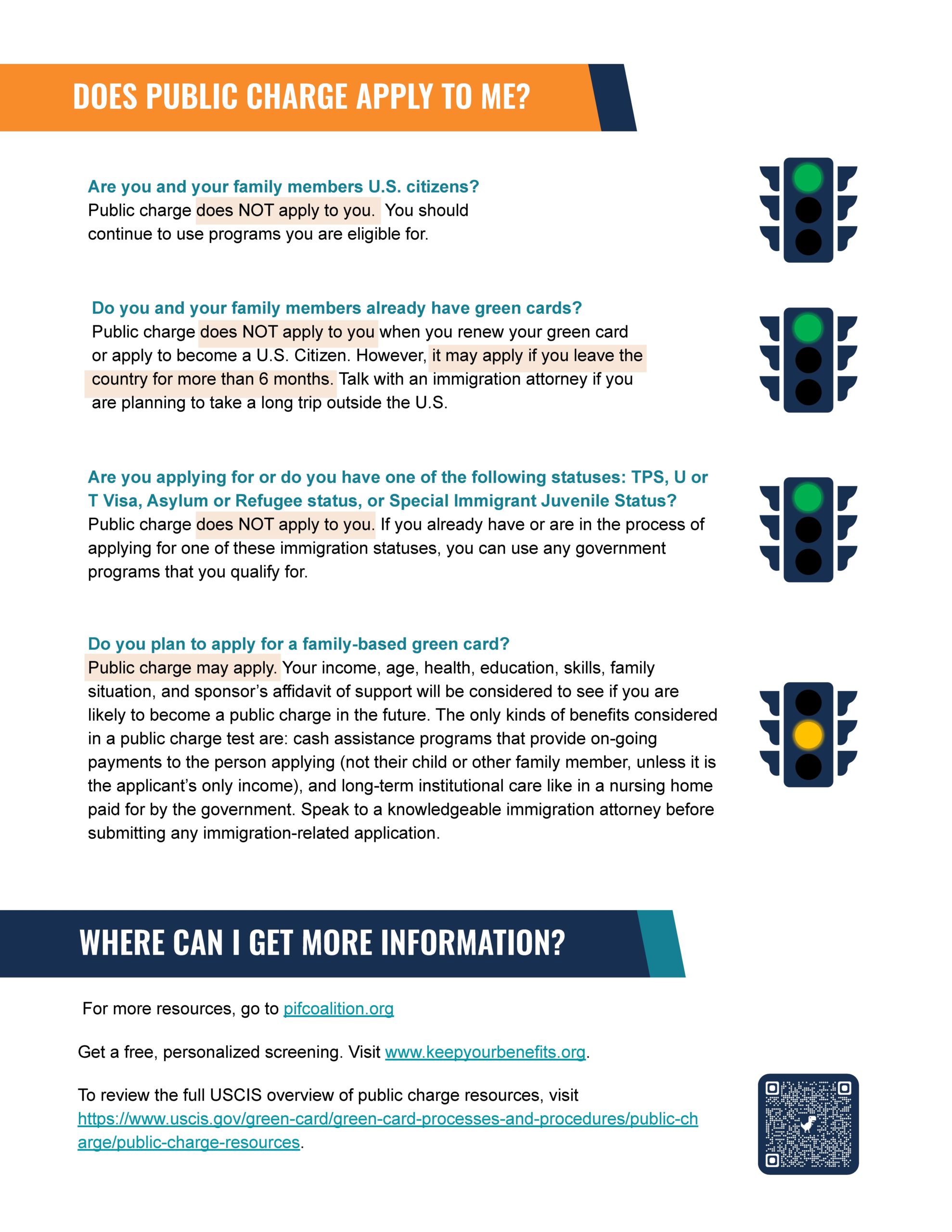UPDATE:
The federal government published a new and final public charge regulation in September 2022. Immigrants and their families can access many of the public benefits programs they need without concern, if they are eligible.
What is Public Charge?
“Public charge” has been a longstanding immigration test administered to immigrants entering the country or seeking permanent residency to determine if they will become primarily dependent on the government for financial support.
What’s happening?
In the past few years, the law about “public charge” has changed several times, leaving families confused about what it all means. On September 9, 2022, US Citizenship and Immigration Services (USCIS) published a final rule on the public charge inadmissibility ground. The new rule will become effective on December 23, 2022.
Who does Public Charge apply to?
Most immigrants who are subject to public charge are not eligible for the programs listed in the rule. Public Charge applies to:
- People entering the U.S. with student, employment or family-based visas
- People applying to adjust their immigration status to “Lawful Permanent Resident” (LPR or green card holder) status from a student, employment or family-based visa. Public charge does NOT apply when you renew your green card or apply to become a U.S. Citizen.
- Lawful Permanent Residents seeking to reenter the U.S. after being out of the country for six months or more.
Public Charge DOES NOT apply to humanitarian immigrants including those applying for:
- Asylum or Refugee status
- Green Card renewal
- TPS, U or T Visa status
- DACA status or renewal
- Special Immigrant Juvenile Status
- Certain individuals paroled into the U.S.
Which benefits are considered?
The only public benefits that are considered negatively in the public charge test are listed below:
- Cash assistance programs that provide on-going payments
- For residents of North Carolina, the only programs that will count negatively are: SSI (payments for disabled persons) and TANF (monthly cash assistance)
- Long-term institutional care at government expense
USCIS (Immigration) will NOT consider ANY benefit programs used by your children or other family members in your household. Your eligible children and family members can use any benefit program they need and Immigration will not ask about it or consider it in your immigration application.
Wondering if public charge applies to you?
This screening tool was developed by benefits experts and immigration lawyers to help communities understand if there is a public charge test for their immigration plans or status:
- Go to keepyourbenefits.org (English)
- Go to TusBeneficiosPublicos.org (Spanish).
- You can also access by text at 650-376-8006.
- Text ‘benefits’ for English
- Text ‘libre’ for Spanish
- Text ‘福利’ for Chinese
- Text ‘lợiích’ for Vietnamese


Get the facts to do what’s best for your family.
Know Your Rights:
From Protecting Immigrant Families:
- Public Charge: Does this apply to me?
Amharic | Arabic | Burmese | Chinese | French | Haitian | Hindi | Hmong | Korean | Spanish | Tagalog | Vietnamese - Should I Keep My Kids Enrolled in Health & Nutrition Programs?
Amharic | Arabic | Burmese | Spanish | Vietnamese | More translations coming soon - KNOW YOUR RIGHTS! Public Charge Messages for Community Members
Amharic | Arabic | Spanish | Vietnamese | More translations coming soon
You Have Rights – Protect Your Health October 24, 2019*
(An overview for mixed-status families when it comes to going to the doctor or enrolling in health insurance – Protecting Immigrant Families Campaign)
10 Facts About Access to Health Insurance for Immigrants and Their Families
(The ACA marketplace open enrollment period presents a great opportunity make sure immigrants and their families understand what recent threats mean for them as they seek health coverage. – CLASP, NILC, and NHeLP)